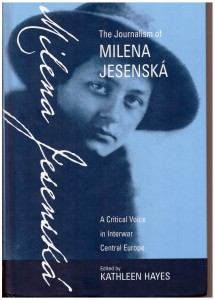 Czech journalist Milena Jesenska (1896-1944) wrote in her article for the “Pritomnost” about “The Art of Standing Still”:
Czech journalist Milena Jesenska (1896-1944) wrote in her article for the “Pritomnost” about “The Art of Standing Still”:
“So when I was a young girl, I lived on the corner of the 28th of October Street and Na perikope Street, and Wenceslav Square lay right under our windows. The tension between the Czechs and the Austrian Germans was manifest at that time (on November 3, 1905) in all sorts of ways. But one Sunday I will never forget as long as I live: I see it only as a memory and I do not know what lay behind it. The Austrian students in their colored caps were marching in a body from the Powder Tower, not along the sidewalk, but in the middle of the street, with booming, well-disciplined steps. All of a sudden, a crowd of Czechs approached from Wenceslav Square – they too were walking in the middle of the street and not on the sidewalks. They walked silently.
At the window, mother held me by the hand, a little more firmly that it was necessary. My father was walking in the front row of Czechs. I recognized him from the window and I was very happy, but mother went white as a sheet and she clearly was not happy.
Then one thing quickly followed another: a crowd of policemen ran out from Havirska Street and positioned itself between the two groups. Na perikope Street was closed to both groups. But both continued to move forward without stopping. Then the Czechs reached the cordon of policemen and they were commanded to stop. They were told once more. And then a third time. Then I have no idea what happened next. I know some shots were fired, that the Czechs were transformed from a quiet into a shrieking crowd, that Na perikope Street was all of a sudden empty, but one person remained standing in front of the guns – MY FATHER. I remember clearly, absolutely clearly, how he stood. Calmly, with his hands at his sides. Next to him something terribly strange was lying on the ground – I do not know if you have seen what a person looks like when he is shot, when he falls on the ground. There is nothing human about him; he looks like a discarded rag. Father stood there about a minute – to mother and me it seemed like years. Then he bent down and began to bandage the human wreck that lay beside him on the pavement. Mother’s eyes were half-closed and two big tears ran down her cheeks. I remember that she took me in her arms as if she wanted to smother me. I did not know what had happened. I only felt the great tension, the unbearable tension and mother’s distress…
 Later, when I saw several times Czech policemen firing into a crowd of Czech workers, when I read about Slovaks wounded by Czech gendarmes, when I realised how hard it is not to run away when the whole crowd is running away, how unbelievably hard it is to stand still when something happens – only then did I understand how rare it is: the art of standing still.”
Later, when I saw several times Czech policemen firing into a crowd of Czech workers, when I read about Slovaks wounded by Czech gendarmes, when I realised how hard it is not to run away when the whole crowd is running away, how unbelievably hard it is to stand still when something happens – only then did I understand how rare it is: the art of standing still.”
It is estimated that Jesenska wrote well over 1,000 articles but only a handful have been translated into English. In this book her own writings provide a new perspective on her personality, as well as the changes in Central Europe between the two world wars as these were perceived by a woman of letters. The articles in this volume cover a wide range of topics, including her perceptions of Kafka, her understanding of social and cultural changes during this period, the threat of Nazism, and the plight of the Jews in the 1930s.
Born in Prague, Milena Jesenska is most famous as one of Franz Kafka’s great loves. Although their relationship lasted only a short time, it won the attention of the literary world with the 1952 publication of Kafka’s letters to Milena. Her own letters did not survive. Later biographies showed her as a fascinating personality in her own right. In the Czech Republic, she is remembered as one of the most prominent journalists of the interwar period and as a brave one: in 1939 she was arrested for her work in the resistance after the German occupation of Bohemia and Moravia, and died in Ravensbruck concentration camp in 1944.
Milena had inherited her father’s art of standing still. Really, like father like daughter.
Here and there are the photos from this book, and flowers are from us with respect and admiration of this remarkable woman of letters and honor.
Listen to: Kondracovci a host: Zora Jandova, vecer ludi dobrei vole
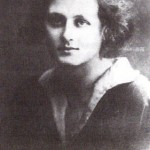
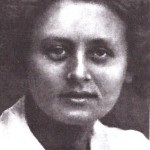
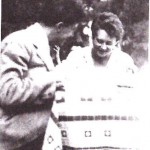
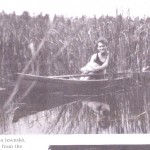
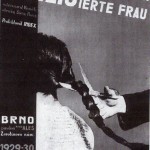
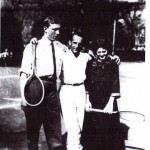
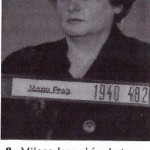
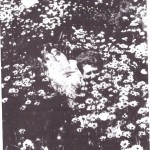
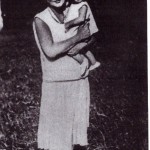
He согласна с лозунгом, в молодости думала также, но потом поняла, что это экстремизм. У ее отца была ответственность, что у него есть жена и дочь? Тот, для кого счастье всего человечества дороже счастья близких для меня – экстремисты. И вообще любая борьба , по-моему, приводит к несчастьям. Может ли кто-нибудь привести пример плодотворной борьбы? Я не говорю об оборонительной борьбе.
Мы не согласны с твоим комментарием. Почему? Потому что люди иногда должны действовать согласно своим убеждениям и принципам в жизни. Таким был отец Милены Ян Йесенски. Поэтому в тяжёлые годы войн или во время ужасных жизненных испытаний, например, страны или маленькой группы населения, пытающейся найти свою принадлежность к определённой национальности, бывают такие времена, когда люди не могут терпеть больше гнёт, тиранию и зло и выходят и присоединяются к рядам повстанцев. Ян Йесенски был известным доктором-дентистом в Чехословакии, который был большим патриотом своей страны.Поэтому он и вышел на улицу на противостояние австро-немецким студентам, кто олицетворяли угнетение чехов. Его дочь Милена унаследовала от отца эту черту характера-ненавидеть социальную несправедливость.Она сохранила жизни многих людей в период нацизма, включая евреев, и её имя значится в Йяд Вашем в Иерусалиме. Без таких людей, как Милена Йесенска и многих других, как она, тысячи других людей были бы мертвы.Как говорили древние: “Тот, кто сохранил хоть одну жизнь, это точно, как если бы он сохранил целый мир”.
Очень сложный вопрос и на одной ноге его не решить.
Это правда. Политическая обстановка в Европе всегда была очень сложной. Да и впрочем, как и остаётся и в настоящее время.Поэтому нужно много читать, смотреть новости и следить ещё за тем, что остаётся за кадром. Действительно, не легко.
С уважением
Автор